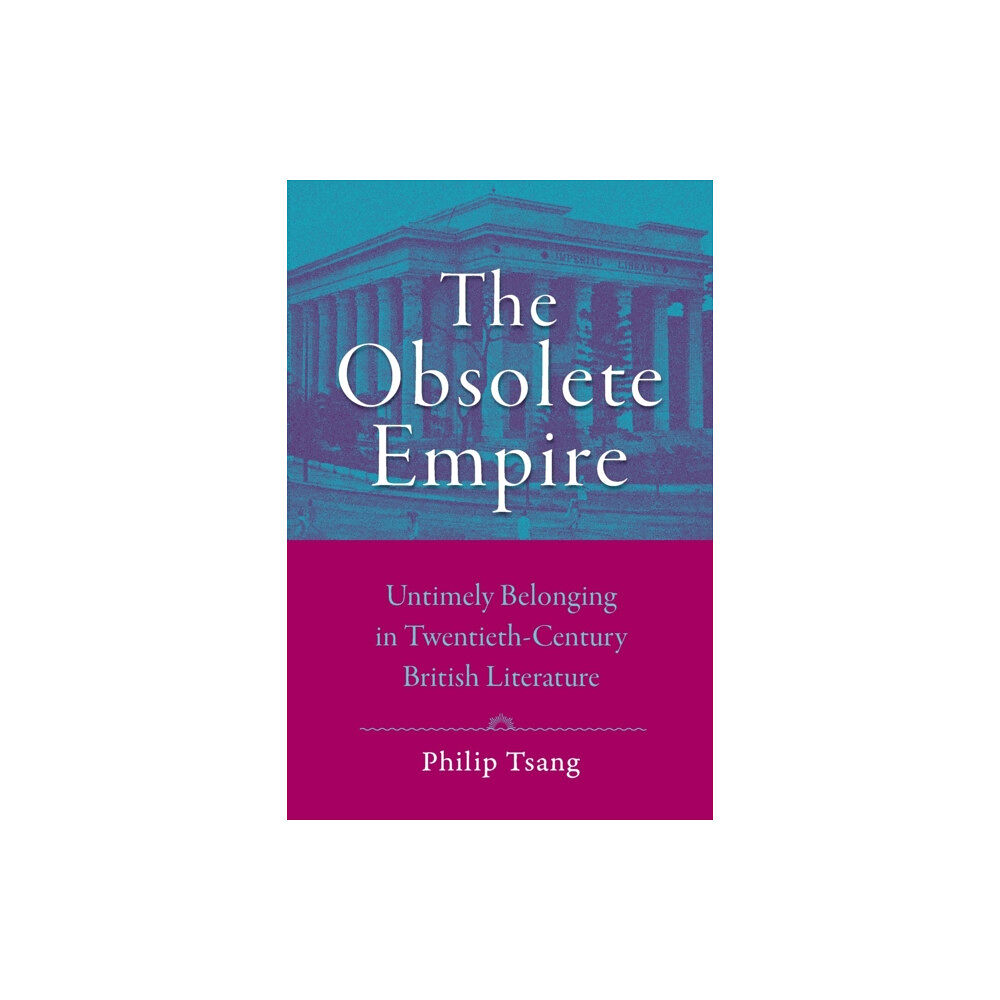- Hem
- Böcker
- Kurslitteratur
- Litteraturvetenskap & Språklära
- The Obsolete Empire (häftad, eng)

The Obsolete Empire (häftad, eng)
Modernist literature at the end of the British empire challenges conventional notions of homeland, heritage, and community. Finalist of th...
429 kr
475 kr
Slut i lager
- Fri frakt
Fri frakt över 299:-
Snabb leverans
Alltid låga priser
Produktbeskrivning
Modernist literature at the end of the British empire challenges conventional notions of homeland, heritage, and community. Finalist of the MSA First Book Prize by The Modernist Studies AssociationThe waning British empire left behind an abundance of material relics and an inventory of feelings not easily relinquished.
In The Obsolete Empire, Philip Tsang brings together an unusual constellation of writers—Henry James, James Joyce, Doris Lessing, and V. S. Naipaul—to trace an aesthetics of frustrated attachment that emerged in the wake of imperial decline. Caught between an expansive Britishness and an exclusive Englishness, these writers explored what it meant to belong to an empire that did not belong to them.
Thanks to their voracious reading of English fiction and poetry in their formative years, all of these writers experienced a richly textured world with which they deeply identified but from which they felt excluded. The literary England they imagined, frozen in time and out of place with the realities of imperial decline, in turn figures in their writings as a repository of unconsummated attachments, contradictory desires, and belated exchanges.
Their works arrest the linear progression from colonial to postcolonial, from empire to nation, and from subject to citizen. Drawing on a rich body of scholarship on affect and temporality, Tsang demonstrates how the British empire endures as a structure of desire that outlived its political lifespan.
By showing how literary reading sets in motion a tense interplay of intimacy and exclusion, Tsang investigates a unique mode of belonging arising from the predicament of being conscripted into a global empire but not desired as its proper citizen. Ultimately, The Obsolete Empire asks: What does it mean to be inside or outside any given culture? How do large-scale geopolitical changes play out at the level of cultural attachment and political belonging? How does literary reading establish or unsettle narratives of who we are? These questions preoccupied writers across Britain's former empire and continue to resonate today.
In The Obsolete Empire, Philip Tsang brings together an unusual constellation of writers—Henry James, James Joyce, Doris Lessing, and V. S. Naipaul—to trace an aesthetics of frustrated attachment that emerged in the wake of imperial decline. Caught between an expansive Britishness and an exclusive Englishness, these writers explored what it meant to belong to an empire that did not belong to them.
Thanks to their voracious reading of English fiction and poetry in their formative years, all of these writers experienced a richly textured world with which they deeply identified but from which they felt excluded. The literary England they imagined, frozen in time and out of place with the realities of imperial decline, in turn figures in their writings as a repository of unconsummated attachments, contradictory desires, and belated exchanges.
Their works arrest the linear progression from colonial to postcolonial, from empire to nation, and from subject to citizen. Drawing on a rich body of scholarship on affect and temporality, Tsang demonstrates how the British empire endures as a structure of desire that outlived its political lifespan.
By showing how literary reading sets in motion a tense interplay of intimacy and exclusion, Tsang investigates a unique mode of belonging arising from the predicament of being conscripted into a global empire but not desired as its proper citizen. Ultimately, The Obsolete Empire asks: What does it mean to be inside or outside any given culture? How do large-scale geopolitical changes play out at the level of cultural attachment and political belonging? How does literary reading establish or unsettle narratives of who we are? These questions preoccupied writers across Britain's former empire and continue to resonate today.
| Format | Häftad |
| Omfång | 312 sidor |
| Språk | Engelska |
| Förlag | Johns Hopkins University Press |
| Utgivningsdatum | 2021-12-28 |
| ISBN | 9781421441368 |
Specifikation
Böcker
- Häftad, 312, Engelska, Johns Hopkins University Press, 2021-12-28, 9781421441368
Leverans
Vi erbjuder flera smidiga leveransalternativ beroende på ditt postnummer, såsom Budbee Box, Early Bird, Instabox och DB Schenker. Vid köp över 299 kr är leveransen kostnadsfri, annars tillkommer en fraktavgift från 29 kr. Välj det alternativ som passar dig bäst för en bekväm leverans.
Betalning
Du kan betala tryggt och enkelt via Avarda med flera alternativ: Swish för snabb betalning, kortbetalning med VISA eller MasterCard, faktura med 30 dagars betalningstid, eller konto för flexibel delbetalning.
Specifikation
Det finns tyvärr inga specifikationer att visa för denna produkt.
